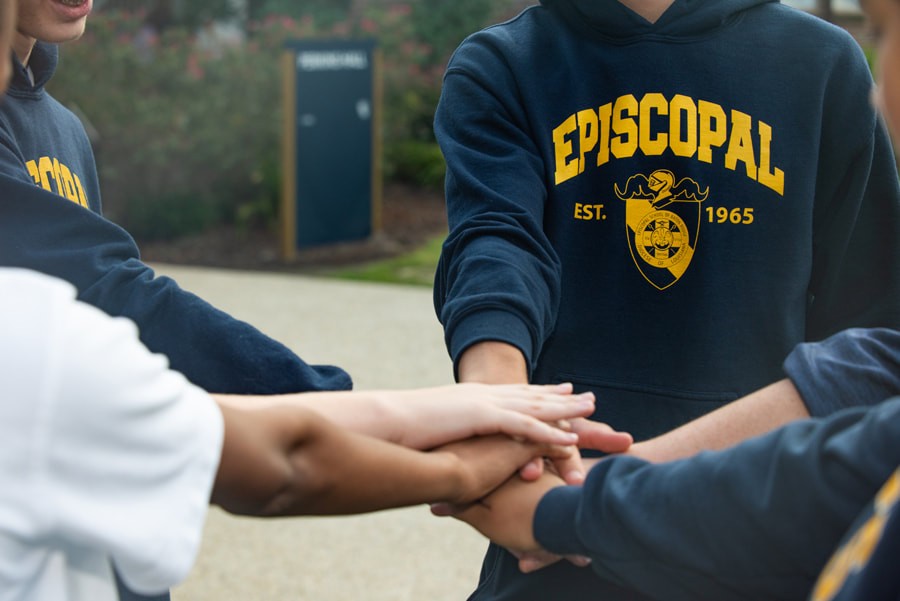- Discover Episcopal
- Admission
- Our Program
- Athletics
- Arts
- Spirituality
- Student Life
- Support Episcopal
- Alumni
- Parent Support
- Knightly News
- Contact Us
- Calendar
- School Store
- Lunch Menu
- Summer Camps
« Back
The Intersection of Academics and Spiritual Life
December 3rd, 2020
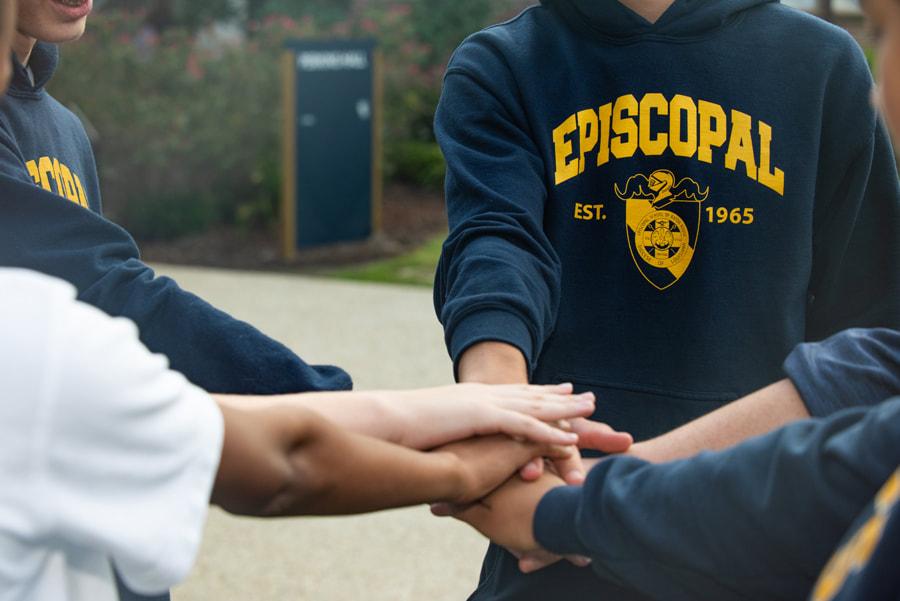
The study of faith and service is not contained within the Lewis Memorial Chapel of the Good Shepherd or the religious studies classrooms. Spirituality concepts are integrated into the Episcopal academic curriculum with faculty offering creative courses designed to make students think and explore. This time of year, there are numerous opportunities for students to put what they learn into action, such as the recent food drive in support of the Shepherd’s Market Food Pantry. Members of the National Honor Society and student athletes delivered 4,600 pounds of food donated by the Episcopal community just in time for the Thanksgiving holiday. While the holidays are a time that inspires service and celebrates faith, these concepts are a year round focus at an Episcopal school.
Episcopal schools are described as Christian communities whose missions integrate spiritual formation into all aspects of the educational experience in a graceful and inclusive way. In the Principles of Good Practice for the Study of Religion in Episcopal Schools, the National Association of Episcopal Schools states, “The study of religion in Episcopal schools is a serious and intentional endeavor, and its place within the total curricular offerings is both secure and central.” Episcopal Chaplain Rev. Kirkland “Skully” Knight is proud of the variety of classes offered in the Religious Studies Department and beyond. “We have passionate teachers who find creative and inspirational ways to teach students about faith and spirituality, as well as their relationships with one another and ultimately with God,” he says. From art and English to Pinwheels for Peace and Advent season, Episcopal students are invited to make connections between subjects in meaningful ways.
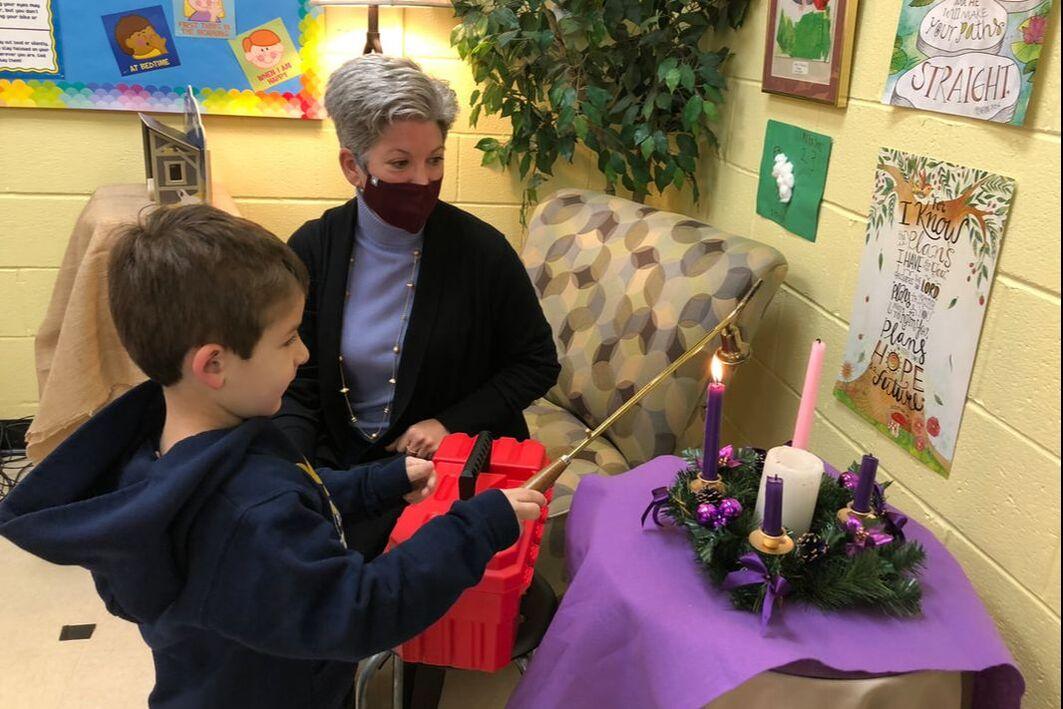
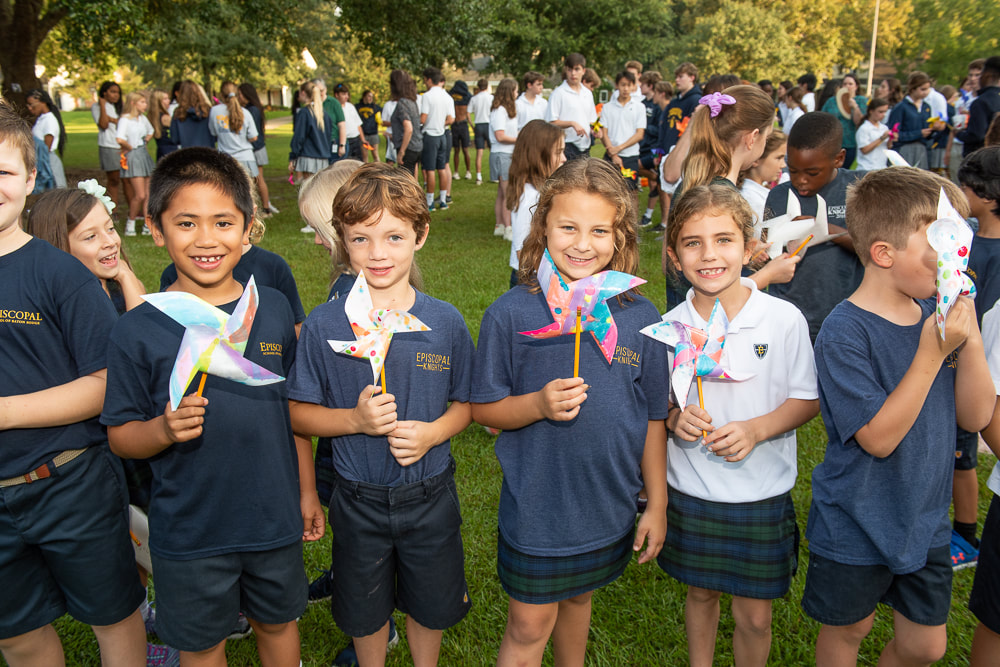
An Artistic Examination of Faith
Episcopal’s new Choral Director Carrie Poynot is taking students on an artistic journey involving faith. In the Faith and Music class, Upper School students explore the role music plays in faith. Poynot says students study a variety of Eastern and Western faiths and the ways in which music is incorporated.
“For the purpose of our class, students must have some understanding of the elements of music and be able to communicate as such in assignments and discussions,” she says. Once students have that understanding, the discussion shifts to different faith practices. “As we learn about each faith, we will discover the commonalities and differences between the music and beliefs of these religions,” says Poynot. “Eventually, in non-COVID-19 times, they will be able to take field trips to Baton Rouge’s Buddhist Temple and Jewish Synagogue. They will hear live music performances in Christian places of worship, experiencing the wide variety of genres in religious music.” Poynot says students’ final class project will be to design their own worship service using music and readings of their choice.
Students also have an opportunity to explore concepts of faith in the Theater and Religion course offered by Arts Department Director Paige Gagliano. Gagliano says the objective is for Upper School students “to identify who they are i.e. their spiritual compass, understand how their actions affect others and what a spiritual superpower they have in that.” To accomplish this, Gagliano uses traditional theatre exercises such as ensemble building, improvisation, Theatre of the Oppressed and Stanislavski’s Acting Method. “Through these exercises we make a connection to how an actor achieves a goal and the tactics an actor uses to how we (at our most authentic selves) achieve goals and what tactics we will use in real life,” says Gagliano. Ultimately, Gagliano wants students to understand that the tactics they use will define their moral compass.
Exploring Faith through Sacred Landscapes
Upper School English teacher Scott Engholm highlights the English and Religious Studies class titled Sacred Landscapes in the school’s course catalogue. Engholm writes “to make sense of this interdisciplinary nature, it would help to think of the study of literature as facilitating a foundation on which to explore themes of religious inspired contemplation, such as existence and purpose, good v evil, fate v free will, religiosity and spirituality, death and after-life, divinity v humanity, as well as many issues involving our relationships to nature and others.” Engholm uses an exploration of places including rivers and oceans, the jungle, the desert and the city to demonstrate the relationship between religious studies and English. Throughout the semester, students delve into the role of water as a force for good or evil, the wildness of civilization and Eastern versus Western philosophies.
Integrating Lessons in Faith
These courses are just a few examples of how spiritual integration takes place in every division. The faculty who teach them hope the experience inspires a lasting interest in the subject. “My hope is that the students will find music to be the perfect means to a deepening faith practiced throughout their life, either as the listener or the performer,” says Poynot. Gagliano, who describes the theater course as soul building, affirming, vulnerable and brave, hopes students ultimately understand their authentic selves. “I want them to leave loving and understanding themselves and working to love and understand every person they come into contact with,” she says.
Read more about Episcopal’s focus on faith and service here.
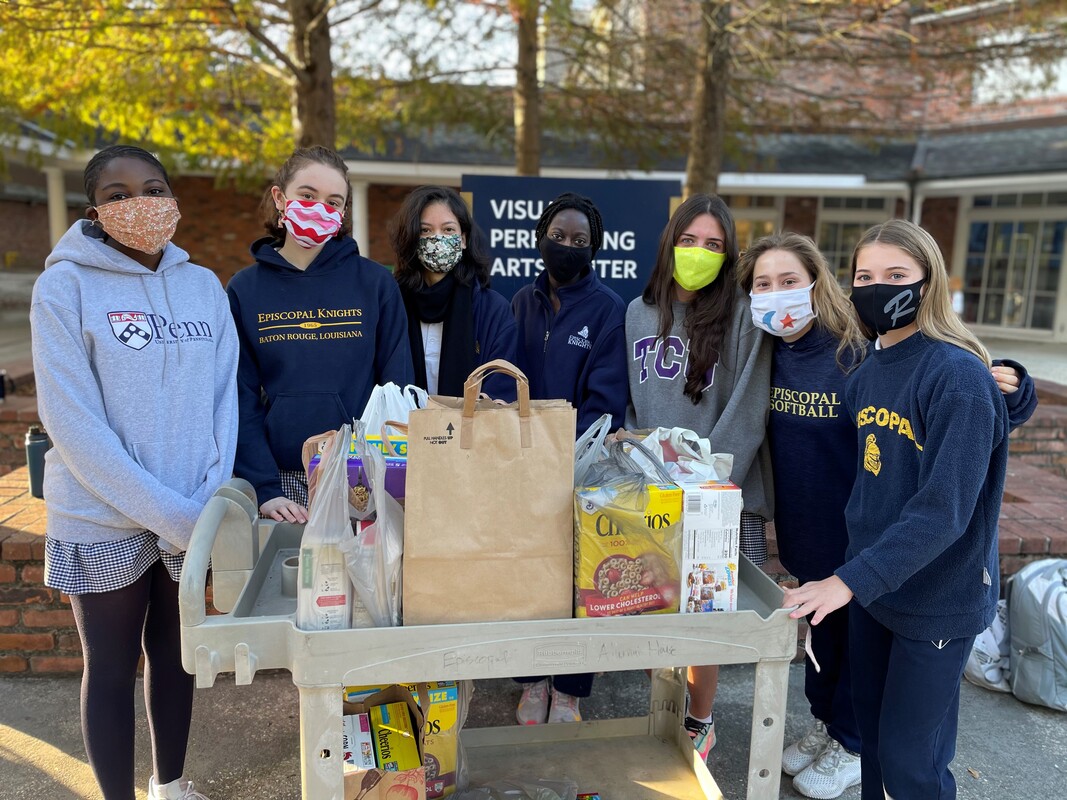
The Episcopal School of Baton Rouge 2024-2025 application is now available! For more information on the application process, to schedule a tour, or learn more about the private school, contact us at [email protected] or 225-755-2685.
Posted in the categories All, Spirituality And Service.
Other articles to consider
 May8College Announcements 5.10.24
May8College Announcements 5.10.24Please join us in congratulating members of the Class of 2024 as they announce their college enrollment decisions.
See Details May7Episcopal's Addisyn Botos Will Continue Track & Field at Southern Miss
May7Episcopal's Addisyn Botos Will Continue Track & Field at Southern MissRead more about Addisyn's decision and her advice for classmates.
See Details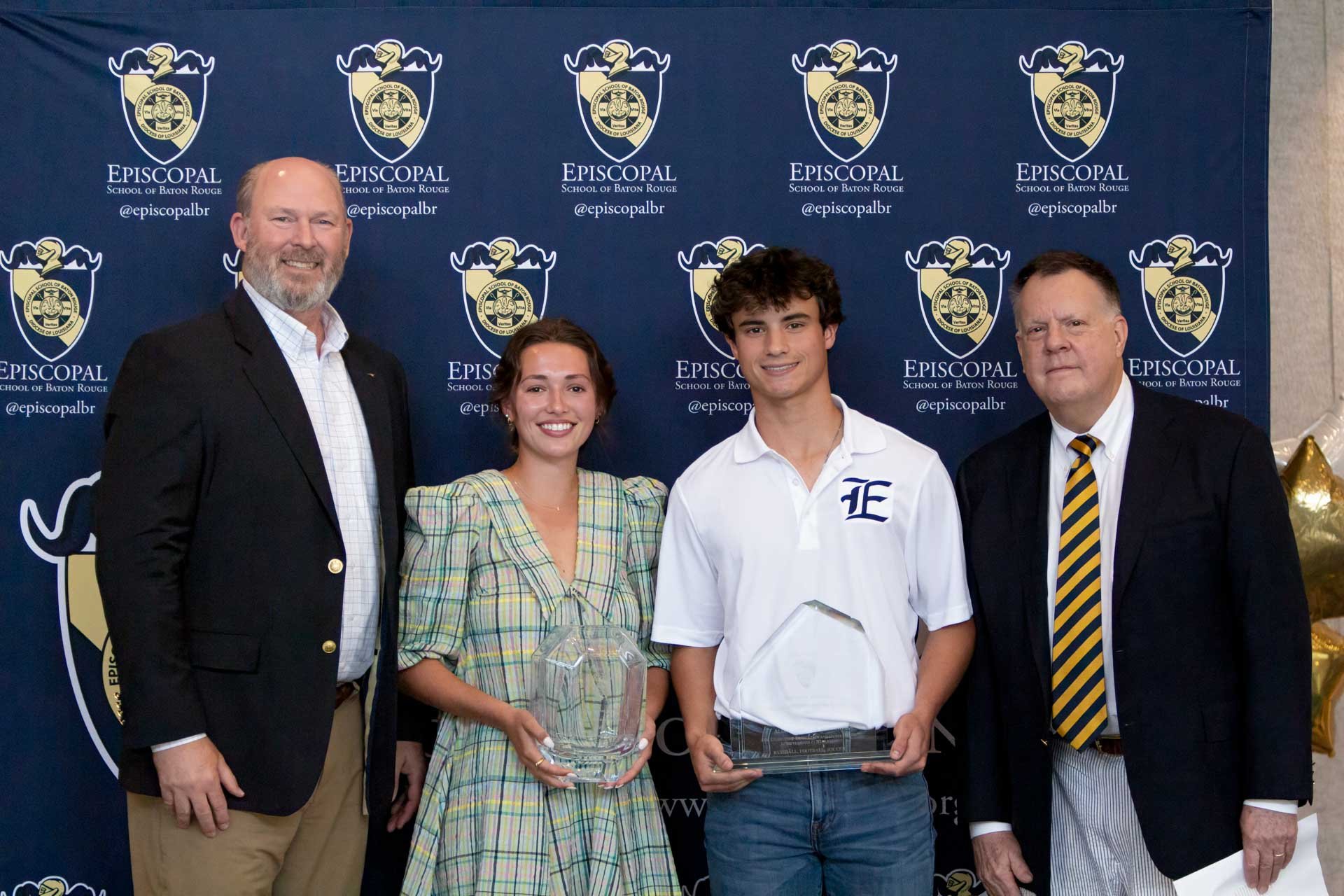 May7Spring Sports Success!
May7Spring Sports Success!Take a look back at the Knights spring sports season.
See Details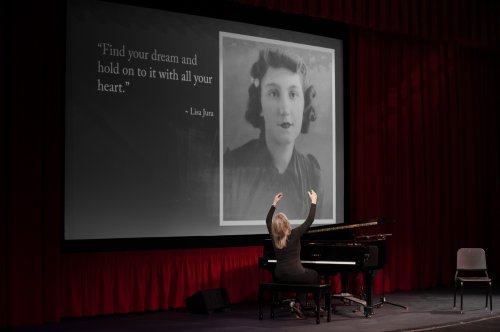 May3Episcopal Audiences Wowed by "The Children of Willesden Lane"
May3Episcopal Audiences Wowed by "The Children of Willesden Lane"This year’s community read author performed her one-woman show for the Episcopal community.
See Details
Categories
- All
- Admission
- Athletics
- College Bound 2019
- College Bound 2020
- College Bound 2021
- College Bound 2022
- College Bound 2023
- College Bound 2024
- Counselors Corner
- Episcopal Alumni
- Giving
- Head Of School
- Lower School
- Middle School
- Spirituality And Service
- Student Work
- The Teachers' Lounge
- Upper School
- Visual And Performing Arts
Recent Articles
- 05/8/24College Announcements 5.10.24
- 05/7/24Episcopal's Addisyn Botos Will Continue Track & Field at Southern Miss
- 05/7/24Spring Sports Success!
- 05/3/24Episcopal Audiences Wowed by "The Children of Willesden Lane"
- 05/3/24Service Learning & Community Impact Students Share Thoughts on Earth Day
- 05/2/242024 Mums of Alums Luncheon Draws Large Crowd of Supportive Mums
- 05/2/24College Announcements 5.3.24
- 04/25/24Revamping Class Competitions with the "Knight Fight" Championship
- 04/25/24College Announcements 4.26.24
- 04/25/24Six Members of the Class of 2024 to Continue Arts Studies


